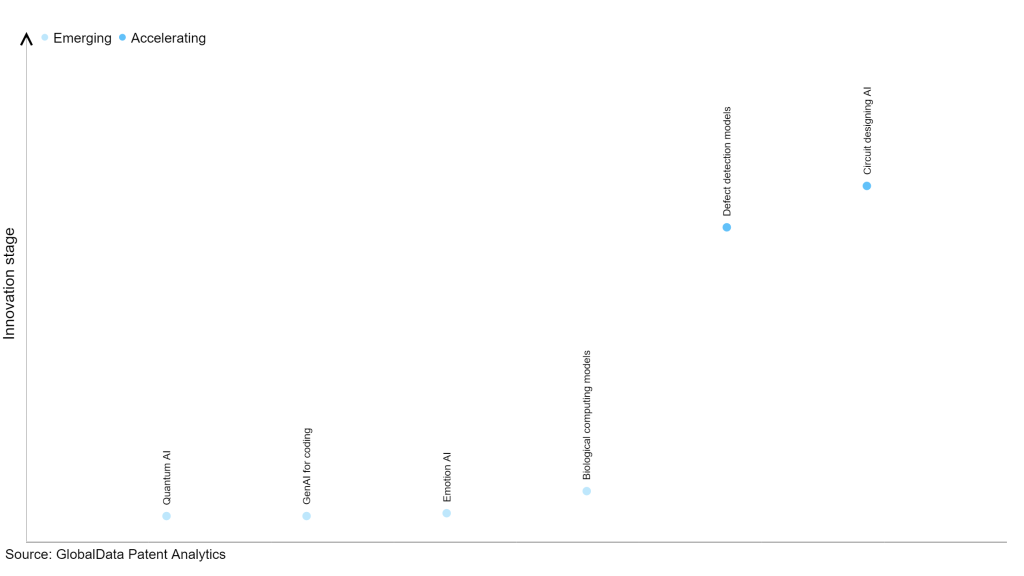The technology industry continues to be a hotbed of patent innovation. Activity is driven by the increasing interest and investment in quantum computing technologies, as well as the potential for groundbreaking advancements in fields such as cryptography, optimization, and material science, and growing importance of technologies such as quantum algorithms for specialized problem-solving, quantum processors for enhanced computational capabilities, and classical-quantum hybrid systems for optimal performance, collectively driving progress in the field of quantum artificial intelligence (AI). In the last three years alone, there have been over 1.5 million patents filed and granted in the technology industry, according to GlobalData’s report on Artificial intelligence in technology: quantum AI. Buy the report here.
However, not all innovations are equal and nor do they follow a constant upward trend. Instead, their evolution takes the form of an S-shaped curve that reflects their typical lifecycle from early emergence to accelerating adoption, before finally stabilizing and reaching maturity.
Identifying where a particular innovation is on this journey, especially those that are in the emerging and accelerating stages, is essential for understanding their current level of adoption and the likely future trajectory and impact they will have.
185+ innovations will shape the technology industry
According to GlobalData’s Technology Foresights, which plots the S-curve for the technology industry using innovation intensity models built on over 1.6 million patents, there are 185+ innovation areas that will shape the future of the industry.
Within the emerging innovation stage, quantum AI, GenAI for coding and emotion AI are disruptive technologies that are in the early stages of application and should be tracked closely. Biological computing models, defect detection models and circuit designing AI are some of the accelerating innovation areas, where adoption has been steadily increasing.
Innovation S-curve for artificial intelligence in the technology industry

Quantum AI is a key innovation area in artificial intelligence
Quantum AI involves applying quantum computing and algorithms to enhance and refine AI systems. By integrating the principles of quantum mechanics with AI methodologies, quantum AI conducts intricate computations and resolves problems with greater efficiency compared to classical computers. The approach capitalizes on the distinctive features of quantum systems, such as superposition and entanglement, to handle and scrutinize vast datasets, refine machine learning algorithms, and augment pattern recognition capacities.
GlobalData’s analysis also uncovers the companies at the forefront of each innovation area and assesses the potential reach and impact of their patenting activity across different applications and geographies. According to GlobalData, there are 230+ companies, spanning technology vendors, established technology companies, and up-and-coming start-ups engaged in the development and application of quantum AI.
Key players in quantum AI – a disruptive innovation in the technology industry
‘Application diversity’ measures the number of applications identified for each patent. It broadly splits companies into either ‘niche’ or ‘diversified’ innovators.
‘Geographic reach’ refers to the number of countries each patent is registered in. It reflects the breadth of geographic application intended, ranging from ‘global’ to ‘local’.
Patent volumes related to quantum AI
Source: GlobalData Patent Analytics
Among the companies innovating in quantum AI, Google is one of the leading patents filers. The company’s patents are aimed at methods and systems involving training quantum evolutions using sub-logical controls. It includes accessing quantum hardware with multi-level quantum subsystems, employing control devices based on control parameters related to the environment, initializing the quantum system, obtaining observables and target quantum states, and iteratively training until a completion event occurs. Other prominent patent filers in the space include Alphabet and International Business Machines (IBM).
In terms of application diversity, International Business Machines (IBM) leads the pack, while Alphabet and D-Wave Quantum stood in the second and third positions, respectively. By means of geographical reach, ELMOS Semiconductor held the top position, followed by Turck duotec and Kyndi.
Quantum AI holds immense significance as it leverages the extraordinary computational power of quantum systems to tackle complex problems that were previously beyond the reach of classical computers. It has far-reaching implications, particularly in cryptography, optimization, and material science, potentially revolutionizing industries and scientific research
To further understand the key themes and technologies disrupting the technology industry, access GlobalData’s latest thematic research report on Artificial Intelligence (AI).
Data Insights
From

The gold standard of business intelligence.
Blending expert knowledge with cutting-edge technology, GlobalData’s unrivalled proprietary data will enable you to decode what’s happening in your market. You can make better informed decisions and gain a future-proof advantage over your competitors.







